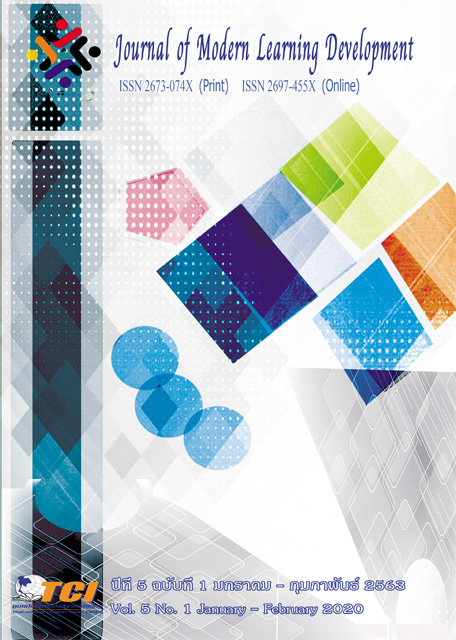The Learning Management based on the Four Brahmavihara Dhammas of Phrapariyatti-dhamma Schools, General Education Department, Ubon Ratchathani Province
Main Article Content
Abstract
The aims of this research were: to study the conditions, to compare and to propose the guidelines for learning management, according to the four Brahmavihara principles (brahmavihāra, sublime state of mind) in the Phrapariyatti-dhamma schools, general education department, Ubon Ratchathani province. This study was carried out by means of a mixed methodology research consisting of quantitative and qualitative research. The population included 85 teachers of Phrapariyatti-dhamma school, general education department, Ubon Ratchathani province; 70 of those were selected as the samples, determined by simple random sampling according to the table of Krejcie & Morgan. The target group consisted of 15 teachers selected by random sampling. The research instruments were a questionnaire and an interview form. The statistics used for data analysis were: Frequency, Percentage and Standard Deviation (SD), t-test (independent), F-test (One-way analysis of variance) and Scheffe's Post hoc Comparison.
The research results were as follows:
1.The conditions of learning management, according to the four Brahmavihara principles (brahmavihāra, sublime state of mind) in the Phrapariyatti-dhamma schools, general education department, Ubon Ratchathani province in overall were rated at a high level of practice. The studied aspects are ranked from 1) upekkhā (equanimity); 2) muditā (sympathetic joy); 3) karuṇā (compassion) and 4) mettā (loving kindness).
2.The comparative results of the learning management, according to the four Brahmavihara principles in the Phrapariyatti-dhamma schools, general education department, Ubon Ratchathani province, classified by the samples’ status in overall and studied aspects showed indifference of practice. Classified by their education, in overall and each studied aspect, there was also no difference. Classified by their work experience, in overall and each studied aspect, there was no difference detected, but classified by the aspect, the difference with the statistical significance level of .05 was found in the aspect of sympathetic joy; this was consistent with the set hypothesis.
3.The guidelines for learning management according to the four Brahmavihara principles in the Phrapariyatti-dhamma schools, general education department, Ubon Ratchathani province are that: 3.1) mettā: the teachers should have desire for students by providing an atmosphere in the classroom so that students and teachers are intimate and friendly and their teaching in each subject should be with kindness; 3.2) karuṇā: the teachers desire that students be free from ignorance; that is to say, transferring knowledge from teachers to students with the desire for students to gain true knowledge without hoping for compensation; 3.3) muditā: the teacher praised the honor of students who have succeeded in various occasions; the teacher encourages the students to attend the training for learner development activities in order to increase the learning potential of the students; 3.4) upekkhā: the teacher organizes teaching and learning activities with neutrality, not prejudice in any party but with rightfulness as a criterion.
Article Details
References
พระสมุห์สมนึก สมณธมฺโม (อุทัยแสงไพศาล). (2562). แนวทางการพัฒนาคุณลักษณะของครูตามหลักพรหมวิหาร 4 ในโรงเรียนมัธยมศึกษา จังหวัดปทุมธานี. พุทธศาสตรมหาบัณฑิต สาขาพระพุทธศาสนา. บัณฑิตวิทยาลัย: มหาวิทยาลัยมหาจุฬาลงกรณราชวิทยาลัย.
พระพรหมคุณาภรณ์ (ป.อ.ปยุตฺโต). (2546). พจนานุกรมพุทธศาสตร์ ฉบับประมวลธรรม. กรุงเทพมหานคร: บริษัท สหธรรมิกจํากัด.
พระปฐม ปญญาทีโป (เนียมศรี). (2560). การจัดการเรียนการสอนกลุ่มสาระการเรียนรู้สังคมศึกษา ศาสนาและ วัฒนธรรมตามหลักพรหมวิหาร 4 ของโรงเรียนมัธยมศึกษาตอนปลาย อำเภอเมืองสระแก้ว จังหวัดสระแก้ว. พุทธศาสตรมหาบัณฑิต พระพุทธศาสนา. บัณฑิตวิทยาลัย: มหาวิทยาลัยมหาจุฬาลงกรณราชวิทยาลัย.
บุญชม ศรีสะอาด. (2550). วิธีการทางสถิติสำหรับการวิจัย. (พิมพ์ครั้งที่ 3.) กาฬสินธุ์ : ประสานการพิมพ์.


